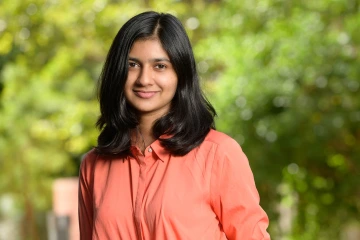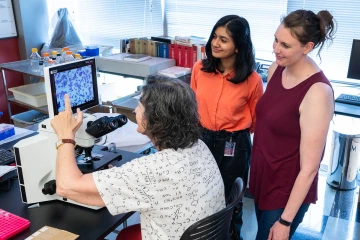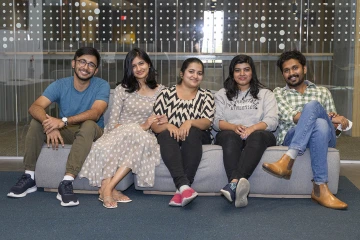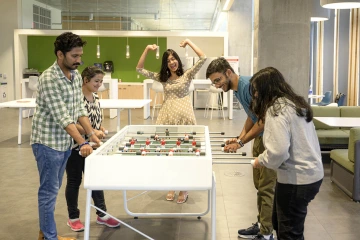The Enduring Impact of a Global Research Internship
Health Sciences International’s Global Research Internship program gives students the chance to gain invaluable experience in and out of the laboratory.
Varna Sree Kumar vividly recalls sitting at home in India one evening when her phone rang. It was one of her professors asking what she thought about a dual-degree program launched by the University of Arizona Health Sciences International in fall 2020.

Varna Sree Kumar is utilizing her background in biotechnology and bioinformatics to study asthma during her Global Research Internship.
“’I have no clue,’” Sree Kumar remembered telling her professor. “I’m more of a computer person. I thought I could never do it.”
Sree Kumar, who has a bachelor’s degree in biotechnology and a master’s in bioinformatics, quickly began learning more about the dual-degree master’s program in cellular and molecular medicine with the UArizona College of Medicine – Tucson and Amrita Vishwa Vidyapeetham University in India. She was especially intrigued by the possibility of traveling to Tucson, Arizona, for a global research internship at UArizona.
“Then I said, ‘I will definitely go for it,’” Sree Kumar said. “It’s one of the best decisions I have ever made.”
In May, Sree Kumar was one of five Amrita students to arrive in Tucson to participate in a research internship as part of the dual-degree program. Despite never traveling outside of India, Sree Kumar says she was not nervous.
“I was on top of the world,” Sree Kumar said. “It was exciting to travel for my work as part of my career. I know these opportunities aren’t possible for everyone.”
Gaining new knowledge and skills

(From left) Donata Vercelli, MD, (seated) shows Sree Kumar and Avery Ann DeVries, PhD, some research findings. Dr. Vercelli says her cosmopolitan lab helps better understand how the environment and microbes living in our bodies can protect from asthma development.
For her research internship, Sree Kumar chose to study asthma under Donata Vercelli, MD, Regents Professor of Cellular and Molecular Medicine. Sree Kumar knew little about the subject, aside from the immunological basics she learned in her cellular and molecular medicine coursework.
“It's an insidious disease,” said Dr. Vercelli, associate director of the UArizona Health Sciences Asthma and Airway Disease Research Center and a member of the BIO5 Institute. “Most of the time, by the time a doctor can make a firm diagnosis of asthma in a child, the airways in this child have already been changed or remodeled in ways that are permanent or at least very difficult to take back to a normal state.”
More than six million children in the United States have asthma. It is the most common chronic condition in children, according to the American Lung Association. Dr. Vercelli’s lab studies allergy and asthma development from the perspective of how the environment and microbes living in our bodies can protect from these diseases.
“It’s one of the best decisions I have ever made.”
Varna Sree Kumar
“There are studies that we have been absolutely critical for that show that early-life exposure to microbes is a very good way to prevent the inception of asthma in children,” Dr. Vercelli said.
Sree Kumar’s role in the ongoing projects is mostly “dry” research. She is being trained in computational approaches to the analysis of complex datasets for genetic and epigenetic analysis that relate to asthma pathogenesis. She credits doctoral student Sydney Van Linden and postdoctoral research associate Avery Ann DeVries, PhD, for helping explain the projects and familiarize her with the research.
Looking back, Sree Kumar said she was both excited and a little scared on her first day in lab, but Dr. Vercelli made her feel at ease.
“I walked in, and we started talking,” Sree Kumar said. “Then she says to me, ‘You are dressed so elegantly; you don’t have to be so formal.’ She made me feel so comfortable, and that was a really big boost for me.”
“I tell her this is just an appetizer,” Dr. Vercelli said. “This is not the main meal. But she is working within a small but ambitious community, and that is invaluable.”
Career choices and life-changing experiences

(From left) Kartik Moolraj Dattani, Varna Sree Kumar, Ardra Mohanan, Gopika Sumitha and Manish Manoharan traveled from Amrita, India, to Tucson, Arizona, to participate in a research internship as part of their dual-degree program.
Dr. Vercelli, who received her medical degree from the University of Florence in Italy, believes working in a new country for the first time will be beneficial for Sree Kumar and the other Global Research interns.
“After I got my degrees in Europe, I went to Boston for 10 years and that changed my life,” Dr. Vercelli said. “Not because I was just in a different country, but because I had a different experience to see how things were done. That changed my way of thinking and my way of doing things forever. That is an enduring impact that I think Varna and other students can take away from this experience.”
She describes her workplace as a “United Nations lab,” where people from countries around the world are working together to prevent childhood asthma.

Sree Kumar (middle) says one of the lasting impacts of the Global Research Internship experience has been the bonds she formed with her peers in the program. Over the summer, the five students lived in the same dorm, played games, shared meals and traveled to must-see spots around Arizona.
“We cherish it,” Dr. Vercelli said. “I think it's a great strength and we all work together extremely well. And I think Varna will greatly benefit from this sort of cosmopolitan environment.”
Sree Kumar’s research internship was expected to last for three months, but she and three of the other summer participants recently extended their time through the fall semester. The students are embedded in different labs pursuing diverse areas of research, but they quickly became a family in Tucson. They shared meals and down time together, and even toured the Grand Canyon and Sonoran Desert Museum as a group.
Beyond the friendships, the experience has provided a sense of clarity as Sree Kumar considers her future.
“Before, I wasn’t sure if I should get a job or pursue a PhD,” Sree Kumar said. “But after meeting the people here and seeing how passionate they are, I am 100% sure I want to go for a PhD now.”
Our Experts
Contact
Blair Willis
UArizona Health Sciences Office of Communications
520-626-2101
bmw23@arizona.edu

